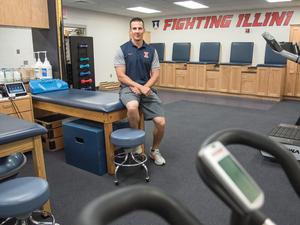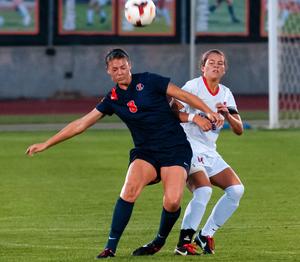
Article reposted from The News-Gazette
Author: Matt Daniels
Jeremy Busch has a lengthy checklist to complete every Saturday from early September to late November.
Well before the Illinois football team even kicks off a game.Busch, about to enter his third season as the head athletic trainer for Lovie Smith’s program, starts gamedays by checking in with the players during breakfast.
Then, between breakfast and the pre-game meal, he and his staff may perform treatments or mobility work with certain players.
“We also are working with the hotel staff to make sure all of our meeting rooms and the pre-game meal have our Gatorade and bottled water available for our student-athletes,” Busch said. “During this time, I also check in with the coaching staff and give them updates on any existing situations or new ones which may arise.”
Once that is done and he is at the stadium — whether it’s Memorial Stadium in Champaign or any other venue the Illini are playing at — the undergraduate athletic training aides Busch supervises, along with the remainder of the football sports medicine staff, setup of the field, locker room and athletic training room with supplies commences.
Then it’s onto pre-game treatments and taping, before touching base again with the Illinois coaching staff, game officials, the emergency medical personnel, the medical spotter, the Illini’s x-ray technician and the opposing team’s sports medicine staff.
All before Chase McLaughlin strikes the opening kickoff or Kendrick Foster waits to return said opening kickoff. Once the game starts, Busch and his staff go into what Busch said is “ijury management mode.”
“If a student-athlete sustains an injury, we remove him from the field and take him into the evaluation tent to be examined by our physicians,” Busch said. “After the game is over,we go through an injury check with anyone who did sustain an injury during the game, while the athletic training aides are cleaning up the field and athletic training room. I then communicate with Coach Smith, the coordinators and appropriate position coaches of their injured student-athletes. Once this is completed, we meet as a sports medicine staff, review all new injuries, and begin to set the treatment plan and coordinate any further diagnostic testing if directed by the physicians.”
Busch is familiar with the Big Ten. Illinois is the fifth school in the league the 2002 University of Iowa graduate, who grew up in Cedar Rapids, Iowa, has associated with since his undergraduate days.
He arrived at Illinois prior to the 2015 season after a one-year stint as the head football athletic trainer at Texas Tech in 2014, which was preceded by two years spent as the assistant football athletic trainer/rehabilitation coordinator at Nebraska. Busch has also worked at Indiana, Minnesota and Iowa, sandwiched in between a six-year stay at Colorado State from 2006 to 2012 as an assistant athletic trainer, his first full-time gig in the profession upon completing his education.
“Growing up in the Midwest and on Big Ten sports, I wanted the opportunity to get closer to home and make a positive impact on student-athletes here at Illinois,” Busch said. “I always had a goal of becoming a head football athletic trainer of a Big Ten football program, and when this opportunity arose, it was one which my family and I couldn’t pass on.”
Busch is a key part of the 25-person sports medicine staff Illinois has. Along with his co-workers there, he communicates with Smith and his coaching staff, along with the team’s strength and conditioning staff and nutritionists who work with the team on a daily basis to inform them of any player who is injured or may need to be modified during in the weight room or during practice.
“Medicine is constantly changing,” Busch said. “There is information and research being discovered today which we didn’t know about 15, five or even two years ago. It is important for us to make sure we are staying up-to-date with evidence-based medicine and in how we practice and implement these changes appropriately.”
Given his extensive time spent at Memorial Stadium and traveling during the season with the Illini, Busch said any down time he has from his job is spent with his wife, Peggy, and the couple’s twins, Emma and Landon.
“I couldn’t do this job, nor stay in this profession, without the love and support from my wife,” Busch said. “She wears every hat at home. She is the family CEO who has her own full-time job, mother, taxi driver for our kids, and my biggest supporter. She devotes a lot of time and energy into our family so I can do this job at a high level. We are a tight-knit family who take advantage of every minute away from the office. With our twins in seemingly every event, my wife and I find our enjoyment in watching them participate and succeed in what they love.”
